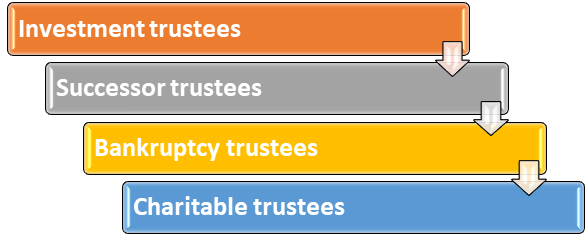Trustee
Updated on 2023-08-29T12:01:55.531014Z
What is trustee?
A trustee is a person or company that holds and manages property or assets on behalf of another person or entity. A trustee could be hired for various reasons, including in the event of bankruptcy, for a charitable organisation, the trust fund, or certain forms of retirement plans or pensions.
The trustee is believed to make profitable decisions regarding the organisation under its control. This is a legal relationship between the trustee and the party in which the trustee is solely accountable for the trust's upkeep, profitability, and performance. Generally, a trustee does not profit from the trust's assets for personal benefit.
If you're a trustee, you'll have to use trust funds or assets to benefit the beneficiary solely. As a trustee, everything you do must be in the beneficiary's best interests. The trust contract may specify what you can and cannot do as a trustee in detail.
For instance, the trust contract could state that the trust covers the costs of an older person's care, so you won't be permitted to spend the money on anything if that is the scenario. So, unless the trust contract indicates otherwise, you may not be able to profit from the trust.
On the other hand, the 'discretionary trust' trustees would have more freedom to make choices. For instance, if the trust was formed to aid many young children, you as a trustee could use it for anything you feel is in the best interests of any of the kids, like financing for a school field trip.
Being a trustee is a legal duty, and you may be concerned about the consequences if you screw up. The only thing you have to do is behave in the best interests of the person who is the beneficiary of the trust, which is referred to as your "fiduciary responsibility." If you don't, you could face legal action with severe consequences.
Furthermore, as a trustee, you could be held accountable if the trust cannot pay its debts or fail to take reasonable precautions while making a decision that results in the trust losing money.
Furthermore, trust is a way to manage someone else's assets and cash.
The following is a list of the three primary participants in any trust:
- The settlor — the individual who funds the trust with cash or assets.
- The trust beneficiary – a person who gains from the trust.
- The trustee- an individual in charge of overseeing the trust.
The settlor is accountable for selecting a trustee to oversee the trust and deciding who would be the trust's beneficiaries. Thus, in a trust, there could be more than one trustee, settlor, or beneficiary.
Someone could form a trust for the beneficiary if they are:
- too small to handle their affairs, usually under the age of 18;
- an elderly person who must pay for long-term care; or
- has a chronic handicap that prevents them from conducting their affairs.
Highlights
- A trustee is a person or company that holds and manages property or assets on behalf of another person or entity.
- A trustee could be hired for various reasons, including in the event of bankruptcy, for a charitable organisation, the trust fund, or certain forms of retirement plans or pensions.
- The trustee is believed to make profitable decisions regarding the organisation under its control.
Frequently Asked Questions (FAQs)
What are the various types of trustees?

Source: © Olandah23 | Megapixl.com
A trust is a legal contract that a person makes to safeguard their property and, after they die, to safeguard their beneficiaries, individuals who are chosen to obtain assets.
Picking a trustee is a crucial part of creating a trust. A trustee may be appointed for charity giving, estate planning, medical planning and tax planning. In addition, the trustee may manage and invest trust assets after the trustmaker dies or during their lifetime.
The list of specific categories of trustees is given below:
Investment trustees: These trustees regularly make investment decisions for a commercial investment account and a personal portfolio.
Successor trustees: They take charge when the trust maker dies or becomes incompetent and is no longer capable of managing their affairs. If this is the case, the first trustee would be the trust originator, and the second would be the successor trustee.
Bankruptcy trustees: They oversee monitoring and managing bankruptcy proceedings for businesses or individuals. Before the bankruptcy is discharged, they usually gain legal control of assets during the administration period.
Charitable trustees: They are in charge of administering the assets of a charitable foundation and distributing them to the selected charities in line with the wishes of the trust owner.

Source: Copyright © 2021 Kalkine Media
What are the responsibilities of a trustee?
A trustee functions as a fiduciary for the designator who delegated authority to the trustee. In representing a will-maker or a person who establishes an estate or a trust, the fiduciary is in the position of trust.

Source: © Olandah23 | Megapixl.com
Responsibilities of a fiduciary include:
- Keeping track of all funds in a person's estate or trust.
- Dedication to the desires of the individual.
- Obey the person's authorised directions.
The following are some of a trustee's other responsibilities:
- Following the terms of the trust contract, as long as they are legitimate.
- Eliminating conflicts of interest and remaining neutral when working with beneficiaries.
- Separation of trust property and assets held by others.
- Managing the trust and the investment trust property with care and diligence.
- Investing diversification unless it's not advisable.
- Detailed documentation is essential.
- Providing periodic reports to recipients as well as federal and state entities.
Tax duties
Taxes on revenue earned from trust assets should always be paid over the trust's existence and may include excise taxes, estate taxes and income taxes. Every year, the IRS mandates estates and trusts to file income tax returns on Form 1041 to record income and capital profits/losses. In addition, after the trust maker's death, a few estates incur estate taxes for the person who founded the trust.